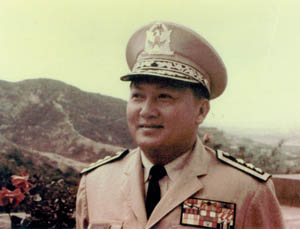

General Dang Van Quang was born in Ba Xuyen province at the edge of the Mekong Delta. Quang first served the French as an NCO from 1947 to 1949, then received his officer training at Hue, where he was a classmate of Nguyen Van Thieu. Like other Thieu classmates, he later benefited from this connection. Under Diem the raising officer converted to Catholicism and was appointed director of the civil guard, the militia of that era. Quang moderated his support for Diem in the early 1950s, then shifted to support the coup plotters who overthrew Diem in November 1963. As an old friend of Nguyen Khanh, Quang supported Khanh's coup in January 1964 and was then appointed to command the ARVN Twenty-first Division in the southernmost part of the country. Khanh swiftly found himself opposed by Vietnames Buddhists, then Catholics, then army cliques. Reaching for loyal supporters, Khanh promoted Dang Van Quang to command the IV Corps, covering the entire Mekong Delta.
General Quang recognized the growing weakness of Khanh's leadership and shifted his own loyalty to Nguyen Cao Ky. Thus, he supported Ky's intervention to counter an anti-Khanh coup in February 1965, but just two days later he sided with Ky in the Armed Forces Council that ousted Nguyen Khanh. Meanwhile, General Quang ran his corps area like a satrapy, ignoring directives from Saigon and gradually developing differences with Ky, now prime minister. Dang Van Quang then shifted his loyalties to General Thieu. Even though Ky succeeded in relieving Quang of command in November 1966, Thieu was able to shift Quang into the South Vietnamese government as minister for planning and development.
Dang Van Quang remained within the Thieu camp from 1967 on, but his actions - three changes of allegiance in three years - were characteristic of the political gymnastics of the ARVN generals. Quang became secretary to the new generals' organization, the National Leadership Council. He then was named national security adviser to President Thieu, a position in which he played power broker and exercised authority over South Vietnamese intelligence and security services. That position Quang kept right through the fall of Saigon, when he was evacuated by helicopter from the U.S. embassy roof, later settling in Canada.
John Prados
The Hidden History of the Vietnam War